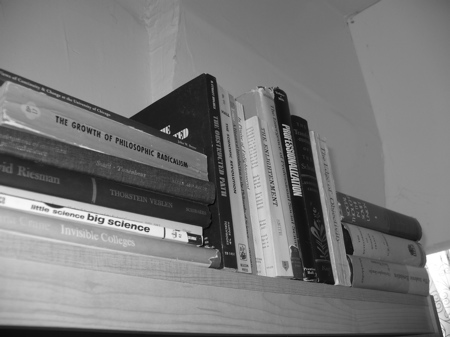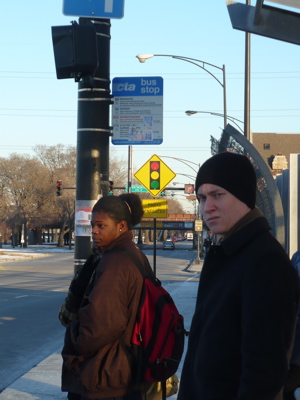Sometimes you hear people, non-academic people, telling you that postmodern writing is gibberish. But remember the old Yankee saying, “one man’s trash is another man’s treasure?”
Likewise with writing: what’s gibberish to my parents is, I must admit, pretty comprehensible to me. This is because academic language is a tool of social differentiation, used to separate academics from laypeople. But even so, translation is possible. Take the following snip of academic language I saw in an email:
Hi Everyone,
The discussion of the relationship between place and power and the idea of being ‘out of place’ is one that I find truly fascinating. Landscape is often implicated in power relations. Probably because of my geographical location, I have most often seen this subject matter approached from a post-colonial point of view, focussing on colonial re-inventions and subsequent representations of land and place as a strategy in establishing notions of ‘rightful’ ownership. The gendered representation of ‘place’ and ‘land’ in is often tied closely with this colonial project. In my own work I have examined this in relation to the 1930-50 governmentally sponsored ‘Nation Building’ projects in South Africa, and focused on the representations of the gendered landscape in Afrikaans literature and painting.
I am currently preparing for a joint series of lectures on landscape. Some of the areas we will be investigating include the use of landscape in computer gaming, and in comics. As comics have not in the past been my major field of study, and academic material on comics in South Africa is rare to say the least, I was wondering if any of you could point me to easily obtainable readings on the subject of ‘land’, ‘landscape’ and ‘place’ in comics. (Incidentally, that list that went around last week with general readings has already been insanely useful and I have several of the books on order from the US already)
Alana, is your paper published anywhere I would be able to get a copy? Any help on this would be greatly appreciated.
I would translate this banal bit of prose as follows:
The discussion of the relationship between place and power and the idea of being ‘out of place’ is one that I find truly fascinating.
“I am an academic, and I am fascinated by The Man and thinking about where The Man lives — and where The Man doesn’t live.”
Elaboration: “I enjoy taking common words like “place” and “power” and treating them as major conceptual problems. I consider this activity truly fascinating. “Place” and “power” could mean any of a huge number of things, but I’ll probably just talk about them in connection with some minor research problem of my own. However, I will make sure to distill any particular places into the abstract, general idea of “PLACE.” Likewise with “POWER.” What I mean by ‘power’ is basically what kids in the street call “the Man” — it has dim connotations of the government, or big corporations, or colonialism, or parents, or all of these and more… And now, an additional twist! Since we’re supposing that there’s some kind of general relationship between POWER and PLACE, we can then ask what happens to POWER when someone or something is ‘out of place.’ Why the scare quotes, you ask? Well, they mean that being ‘out of place’ is also being made into a rarified academic concept, disconnected from popular usage. But wait — one final note! Since other scholars have also been talking about these abstractions for some time, I will be able to make myself matter by joining their discussion.”
Landscape is often implicated in power relations.
“The Man has ideas about how the world should look and how landscapes should be put together.”
Elaboration: ” ‘Implicated in’ just means ‘related to.’ And ‘often’ is completely meaningless in this context — I don’t really mean that most power relations involve a landscape, because a moment’s thought suggests that lots and lots of power relations don’t have much to do with landscapes. I just stuck in the ‘often’ to make it sound like I’m doing work on something important, and to make myself sound legitimate — which is an important part of making yourself a good academic, OK? so get off my back!”
Probably because of my geographical location, I have most often seen this subject matter approached from a post-colonial point of view, focussing on colonial re-inventions and subsequent representations of land and place as a strategy in establishing notions of ‘rightful’ ownership.
“People near me usually think about The Man and landscapes in terms of who owns what and how they justify owning it.”
Elaboration: “I live in South Africa, and people down here naturally tend to think about academic questions from a South African perspective. We used to be a colony, but now we’re a post-colony, so we consequently have a post-colonial point of view. One of the things we study is how people try to prove their rights to own land by using certain ideas about land. These ideas have been changing since the colonial era.”
The gendered representation of ‘place’ and ‘land’ in is often tied closely with this colonial project.
“People think that land has something to do with gender. That has something to do with colonialism. I wouldn’t want to say what exactly.”
“Again, the words ‘often’ and ‘closely’ have no meaning here aside from making me sound important.”
In my own work I have examined this in relation to the 1930-50 governmentally sponsored ‘Nation Building’ projects in South Africa, and focused on the representations of the gendered landscape in Afrikaans literature and painting.
“I studied Afrikaans literature and painting in the 30s-50s and wrote about all these ideas in connection with those.”
I am currently preparing for a joint series of lectures on landscape. Some of the areas we will be investigating include the use of landscape in computer gaming, and in comics. As comics have not in the past been my major field of study, and academic material on comics in South Africa is rare to say the least, I was wondering if any of you could point me to easily obtainable readings on the subject of ‘land’, ‘landscape’ and ‘place’ in comics. (Incidentally, that list that went around last week with general readings has already been insanely useful and I have several of the books on order from the US already)
“Recently I got this sweet new gig — but honestly I’m not really ready for it and probably not all that qualified for the job. Can anyone help me out?”
Alana, is your paper published anywhere I would be able to get a copy? Any help on this would be greatly appreciated.
“If you help me, I might put your name in the Acknowledgements section of my next essay.”
So, if you put the whole translation together, it looks like so:
“I am an academic, and I am truly fascinated by The Man and thinking about where The Man lives — and where The Man doesn’t live. The Man has ideas about how the world should look and how landscapes should be put together. People near me usually think about The Man and landscapes in terms of who owns what and how they justify owning it. Also, people think that land has something to do with gender. That has something to do with colonialism. I’m not saying what exactly. Anyway, I studied Afrikaans literature and painting in the 30s-50s and wrote about all these ideas in that connection. Recently I got this sweet new gig — but honestly I’m not really ready for it and probably not all that qualified for the job. Can anyone help me out? If you help me, I might put your name in the Acknowledgements section of my next essay.”


